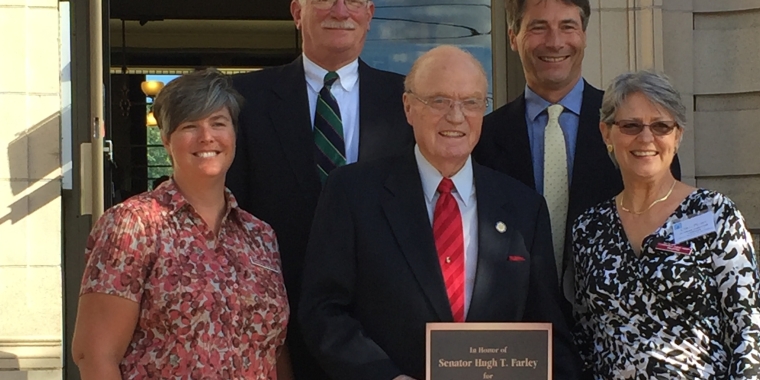
Senator Farley And Governor Pataki Announce Coordinated Capital Region Impact Operations
Senator Hugh T. Farley (R,C - Schenectady) joins Governor George E. Pataki today in announcing the results of a two-month coordinated IMPACT operation conducted through an historic partnership among the three Capital Region IMAPCT task forces.
Earlier this Spring, members of the Albany, Troy and Schenectady IMPACT Task Forces -- co-chaired by the respective district attorneys and police chiefs -- expanded their IMPACT operations and implemented an extensive covert and overt collaboration amongst the three IMPACT Task Forces. Leveraging their collective resources with the additional IMPACT partners in the Capital Region, the expanded IMPACT operations have resulted in more than 450 arrests, the seizure of more than $37,000 in illegal drug money and the confiscation of more than 4,000 illegal CDs and DVDs. In addition, the task force also seized 41 illegal guns.
"Operation IMPACT brings together state, local and federal personnel and resources to fight crime where it is needed the most," Governor Pataki said. "Since 2004, the first phase of IMPACT in the Capital Region has featured undercover operations targeting illegal drug operations and street violence, and the most recent arrests made in the last few weeks show just how successful this program has been. Working together, the Albany, Troy and Schenectady IMPACT Task Forces have been able to expand on the already successful operations and collectively crack down on the illegal drug operations and other quality-of-life crimes that affect this region as a whole. I want to commend these IMPACT Task Forces for taking full advantage of the resources IMPACT has to offer. Their foresight and cooperation will ensure that every person in the Capital Region can walk the streets without fear."
"New York is already the safest large state in the nation. By working together through Operation IMPACT, and collaborative partnerships like the one here in the Capital Region, I know we can make New York the safest of any state in America," the Governor added.
Lt. Governor Mary Donohue said, "As a former District Attorney and State Supreme Court Justice, I know firsthand how effective law enforcement is when local, State and Federal law enforcement officials come together to keep our streets safe. Operation IMPACT has provided the means for law enforcement to come together and detect, prevent and punish criminals. As a resident of the capital region, I am confident that Operation IMPACT will continue to benefit all of our communities."
Senate Majority Leader Joseph L. Bruno said, "The Capital Region has some of the finest law enforcement officials anywhere in the State. The success of Operation IMPACT shows the terrific job they do by working together to protect our families and communities. I applaud Governor Pataki for his continued efforts in bringing together forces all over the state to ensure that all New Yorkers live safely and securely."
Senator Hugh Farley said, "This is a very positive report on the results of Operation IMPACT in Schenectady. As upstate cities like Schenectady try to attract more residents and jobs, quality of life issues -- such as safe streets and neighborhoods -- become very important. On behalf of all of us in Schenectady, I want to thank Governor Pataki, Director Parker, and the law enforcement professionals from both the State Police and the Schenectady Police Department who have made this successful report possible."
Assemblyman Ronald Canestrari said, "The Operation IMPACT program has given our local law enforcement agencies much needed support in their vigilant efforts to ensure the public's safety and combat criminal activity in our communities."
Assembly Jack McEneny said, "Operation IMPACT offers real promise that we will be able to conquer the triple scourge of illegal drugs, guns and gangs in every neighborhood where the problems arises."
Assemblyman James N. Tedisco said, "As the newly appointed Chairman of the Assembly Minority Task Force on Crime in our Communities, I commend Governor Pataki, DCJS Director Parker and hundreds of state and local law enforcement officers involved with Operation IMPACT in helping to keep our communities and streets safe."
1
Director of Criminal Justice Chauncey G. Parker said, "Operation IMPACT is one of many critical tools Governor Pataki has provided law enforcement agencies to reduce crime and make our cities safer. Attacking crime in specific communities through a concentrated, coordinated effort of multi-jurisdictional law enforcement services is the best way to make our neighborhoods safe for our families."
City of Albany Mayor Gerald D. Jennings said, "I am enthusiastic about the influence that Operation Impact has had on the City of Albany in the past year. We have made significant strides in making the streets safer for the citizens of Albany. Public Safety has always been my highest priority and the resources provided by Governor Pataki have been instrumental in taking violent criminals, drugs and guns off the streets of Albany."
Troy Mayor Harry J. Tutunjian said, "Crime in the City of Troy is down nearly 5 percent from previous years, and one of the reasons for that is the help we have received since July of last year from Governor George Pataki and Project IMPACT. Focusing on quality of life crimes inside of Troy has had a positive effect on not only the crime index, but with the residents in neighborhoods as well. Increased police presence has indeed lead to more arrests. Those arrests make the streets safer, while providing an increased sense of security that did not exist for quite some time."
Schenectady Mayor Brian Stratton said, "Without question, through the assistance of Operation IMPACT, we are working together to make Schenectady's streets and neighborhoods safer. We greatly appreciate Governor Pataki's support for this valuable and needed program."
Albany County Executive Mike Breslin said, "The collaboration of state, local and federal agencies is making a significant impact on reducing crime in our communities. The Albany County Probation Department has been working closely with the members of the IMPACT task force to heighten supervision of parolees and to identify and arrest wanted criminals. I salute all those involved for their tireless efforts to make our communities safer and improve our quality of life.
New York State Police Superintendent Wayne E. Bennett said, "The New York State Police continues to be dedicated to supporting the community policing efforts of local police departments throughout New York State by providing the specialized support and resources of our Troopers and Investigators. This collaborative partnership of Capital Region police resources and strengths, targeting specific areas of serious and violent crime, has shown great success."
New York State Division of Parole Executive Director Anthony G. Ellis II said, "The New York State Division of Parole is dedicated to community safety initiatives. The recent arrests in the Capital Region, as a result of Operation IMPACT, are proof that the expertise and support provided by Parole Officers is vital to the successful coordinated crime reduction strategy across New York State."
Capital Region IMPACT
The Capital Region IMPACT task force is coordinated by the Albany, Troy and Schenectady police chiefs and district attorneys. The task force consists of among others, New York State Division of Criminal Justice Services; New York State Division of Parole; New York State Police; New York State Liquor Authority; Albany County Sheriff; Albany County Probation; Schenectady County Sheriff; Schenectady County Probation; Rensselaer County Sheriff; Rensselaer County Probation; the Federal Bureau of Investigations (FBI); U.S. Marshal's Service; U.S. Attorney's Office; Drug Enforcement Administration (DEA); Immigration and Customs Enforcement (ICE); Bureau of Alcohol, Tobacco Firearms and Explosives (ATF); and SUNY Albany. In the Capital Region, IMPACT task forces received a total of $478,748 (Albany: $241,116; Rensselaer: $116,140; Schenectady: $121,492) in IMPACT funding for 2004. In 2005, task forces are eligible to apply for a total of $928,300 (Albany: $468,300; Rensselaer: $230,000; Schenectady: $230,000) to continue and expand their IMPACT operations. The specific goals of the Capital Region IMPACT strategy include reducing violent crime and crimes that affect quality-of-life for Albany, Troy and Schenectady residents. In an effort to accomplish these goals, the IMPACT
task force partners have conducted parole and probation home visits; undercover gun buys, prostitution stings, and drug buyer beware operations; as well as operations with investigators from the Recording Industry Association of America to reduce the number of illegal CDs and DVDs sold on the street. Parole and probation officers also conducted bar checks and parolee visits in the areas where known criminal conduct occurs.
In addition to today's arrests, since the operations began earlier this spring, the Capital Region IMPACT Task Force has made 482 arrests, resulting in 145 felony and 337 misdemeanor charges. Also, $37,018 in illegal drug money has been confiscated, 4,280 stolen CDs and DVDs were recovered and 41 illegal guns were seized.
City of Albany Police Chief James E. Turley said, "Operation Impact is a prime example of how law enforcement initiatives can be accomplished most effectively when you combine federal, state and local law enforcement
resources. Operation Impact has targeted vulnerable areas in the City of Albany with a high degree success and we will continue concentrating on neighborhoods that are vulnerable to violent crime."
Chief Nick Kaiser of the City of Troy Police Department said, "The IMPACT program is a key ingredient of the recipe for the improvement of the quality of life in our communities. We hope that the obvious success of this initiative will serve as a catalyst for future collaborative efforts between local, state and federal law enforcement agencies."
City of Schenectady Police Chief Michael Geraci said, "The leadership of DCJS with Operation IMPACT, and the willingness and cooperation of all of the participating agencies, has provided significant intelligence and operational benefits to our department's law enforcement initiatives in the City of Schenectady. On behalf of Mayor Brian Stratton, the members of the Schenectady Police Department, and the citizens of Schenectady, I extend our thanks to all of our coalition partners and look forward to our continued working relationship."
Albany County District Attorney David Soares said, "Operation Impact is the right tool at the right time to target the rising wave of gun violence in our communities. Violent crime and gun violence are a top priority for local law enforcement. We want to thank Governor Pataki for providing us with the tools to fight these crimes which are destroying our neighborhoods."
Rennselaer County District Attorney Patricia DeAngelis said, "As District Attorney, I have seen first hand the positive results of Operation Impact in Rensselaer County. In 2004, the Rensselaer County Drug and Gang Task Force arrested 120 more individuals than in 2003, resulting in an additional 219 charges. I applaud Governor Pataki for his commitment to improving the quality of life for the people of Rensselaer County by giving law enforcement more resources to combat drug and gun violence."
Schenectady County District Attorney Robert Carney said, "Operation IMPACT works, not only because of the additional state financial assistance, but because of the model of collaboration under which we are referring gun cases for federal prosecution, using surveillance cameras to support State Police and Schenectady vice squad operations, and tapping the knowledge of parole and probation to prevent crime."
Operation IMPACT
Operation IMPACT was first announced during the 2004 State of the State Address. Designed to assist the areas of New York State with disproportionately high crime rates, IMPACT originally targeted the 15 counties (Albany, Broome, Dutchess, Erie, Monroe, Nassau, Niagara, Oneida, Onondaga, Orange, Rensselaer, Rockland, Schenectady, Suffolk and Westchester) that accounted for 80% of the crime outside of New York City. In the 2005 State of the State Address, Governor Pataki expanded Operation IMPACT to enhance operations in the original 15 IMPACT counties, to bring new IMPACT operations and resources to other parts of the state designated as crime "hot spots" through crime mapping and analysis, and to make an additional 100 State Troopers available for IMPACT operations (bringing the total commitment of State Troopers to 400).
Key state resources available through Operation IMPACT include: New York State Police IMPACT Units (officers who specialize in gang, gun and drug-trafficking crimes) and Division of Parole personnel to assist local law enforcement agencies in reducing violent street crime. Other state agencies that are full partners in IMPACT, lending their expertise and resources to all target counties, are the Division of Criminal Justice Services, Division of Probation and Correctional Alternatives, the Department of Taxation and Finance, the Office of Children and Family Services and the State Liquor Authority, among others.
In the first year of IMPACT operations, murder in the original 15 IMPACT cities is down by nearly 20%, robbery in the IMPACT cities is down nearly 10%, and overall crime in the 15 original IMPACT counties has declined 4% in 2004 compared to 2003. And, in 2004, Rochester -- the first IMPACT site launched and the first city in New York State to implement Ceasefire, an innovative crime reduction strategy -- had one-third fewer murders, including a 70% drop in murders of the most at-risk portion of the population, young African American men.
Under the Governor's recently announced partnerships with John Jay College -- which is working in concert with the Rochester Institute of Technology --the Ceasefire initiative will be implemented in other key IMPACT sites across the state. In addition, crime analysts from UAlbany are working in other IMPACT sites to help them better understand and respond to their crime problems.
Over the past ten years, violent crime in New York State has been cut in half and crime is at its lowest levels since statewide crime reporting began - nearly 40 years ago. In 1994, New York State was the sixth most violent state in the nation. Today, a decade later, New York is the seventh safest state overall, and the safest large state in the nation.



